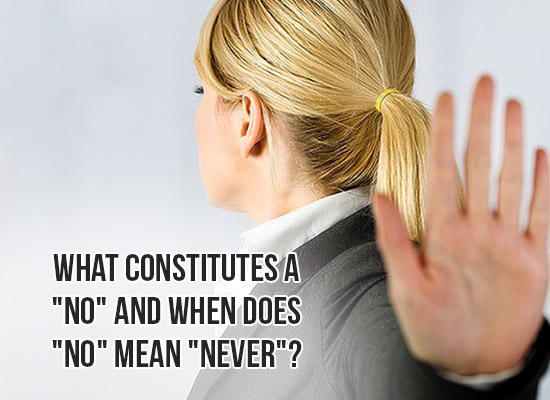“I Won’t Give You Anything – Ever!”
by Brian Saber
What constitutes a “no” and when does “no” mean “never”?
 After the great enigma of determining what to ask for, figuring out when to stop asking must be the next greatest enigma. Do we stop if our donors don’t call us back? If they tell us they won’t give this year? If they say they are supporting other causes? What constitutes a flat-out, permanent “no”?!
After the great enigma of determining what to ask for, figuring out when to stop asking must be the next greatest enigma. Do we stop if our donors don’t call us back? If they tell us they won’t give this year? If they say they are supporting other causes? What constitutes a flat-out, permanent “no”?!
My golden rule is to never assume I know what the donor is thinking. We know the old adage about assuming, and while it won’t necessarily make us asses in this case, it will keep us from getting at the truth and maximizing giving.
I start from the premise we’re all adults here, and we understand the rules of engagement; open communication, honesty, and mutual respect. Within that context, I believe donors have a moral obligation to respond openly and honestly. And we have to take what they say at face value.
Need advice dealing with tough donors? Watch the Asking Matters video training, Maybe? No? – How to Respond, where you’ll dive deep into these common responses. This is the time to ask questions and to provide direction and support that will help the donor commit to a gift.
No Return Call, Email, or Text
This is an easy one for me. If I’m in the middle of a gift negotiation and someone has either met with me or said they’d like to meet with me, I do not stop contacting the donor until the donor tells me to. This is a conversation, no different from an in-person conversation. In person, donors wouldn’t sit there blank faced, just because I’ve sent an email or left a phone message doesn’t negate the obligation to respond.
First I leave messages or send emails (I’m not a text user for donor communication yet!) at one- or two-week intervals, depending on the case. After two or three of these, I might take a short break and try again. Eventually, I will communicate how I don’t want to assume anything, but I thought the donor was interested, and that I’d be grateful if the donor would let me know where he or she stands. If I still can’t get anywhere, I might ask a volunteer who knows the donor to make contact.
Invariably, I get an apology and an excuse about how busy the donor’s been. To some extent, it reminds me that although the donor’s gift is high on my priority list, that gift is much lower on their list.
However, it also reminds me that everyone doesn’t share my code of conduct, and everyone doesn’t respect people equally who they perceive to be in a subjugated position. Rather than let this bother me, I see it as a reflection on the donor’s behavior and remind myself it’s not about me (as a Kindred Spirit I often need that reminder!).
Bottom line, no response is not a response.
Take Them at Their Word
We’ve got to believe what our donors tell us.
If they tell us “not now,” then we have to thank them and, at the same time, ask when we can come back. Perhaps they’re trying to be polite, but we can’t and shouldn’t assume that. We need to ask questions that will help them give us complete and accurate answers.
“May we come back at another time? Might you consider a gift six months from now? Next year? Can you help guide us? What would influence your decision to give?”
If they tell us they have to think about it, then that’s exactly what we must believe they need to do.
“Thank you for considering a gift. May I contact you again in two weeks to follow up? Or when would you like me to contact you? What other information would be helpful to you in making your decision?”
If they tell us they’re supporting too many other charities already…
“How wonderful that you’re so charitable. Can you add us to your charitable roster in the future? Might we come back next year or in two years? And may we engage you in the meantime?”
If the project doesn’t interest them…
“Thank you for sharing that with me. What programs of our organization do you find most compelling? What resonates for you?
My Rule of Thumb
For me, nothing short of “I will never make a gift of any amount for any project at any time” deters me. If a donor doesn’t tell me this in some clear fashion (or tell a third party to tell me that!), I will persevere. That’s my job.
I also believe that when we’re persistent, we send the message that our donors’ gifts are important. Donors want to feel their gifts matter. If we try hard to secure them, we underscore the value of those gifts. When we walk away we send the wrong message.
None of this is easy. As a Kindred Spirit I’m conflict averse, so having to reach out to donors multiple times, negotiate with them in meetings, and ask pointed questions pushes my buttons. But they’re my buttons, and that means reminding myself why I care, why my organization is so important, and that this isn’t about me.
I’m just the messenger. And if I reach out and persist until I get a clear answer, I’m being the best messenger I can be.
Here’s to finding your voice and funding your vision.





